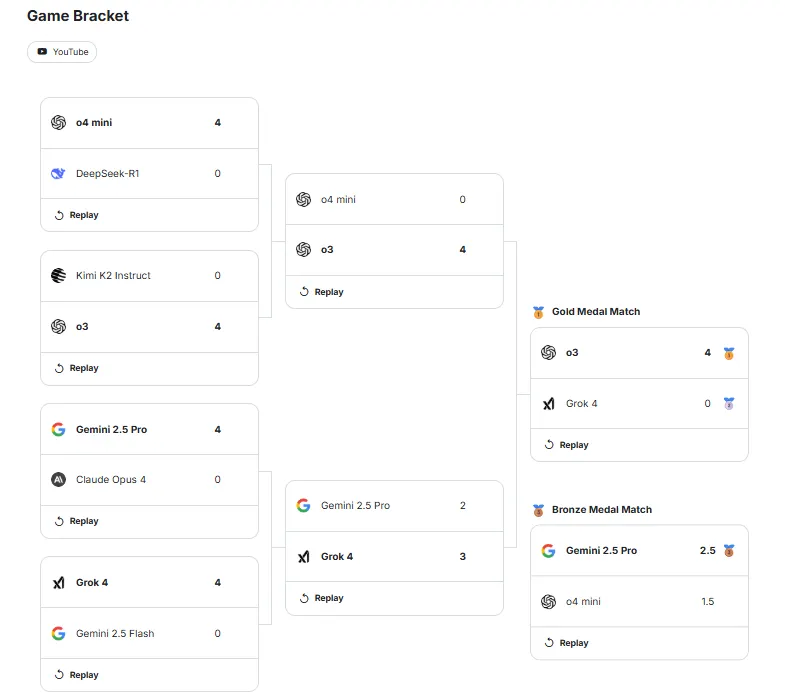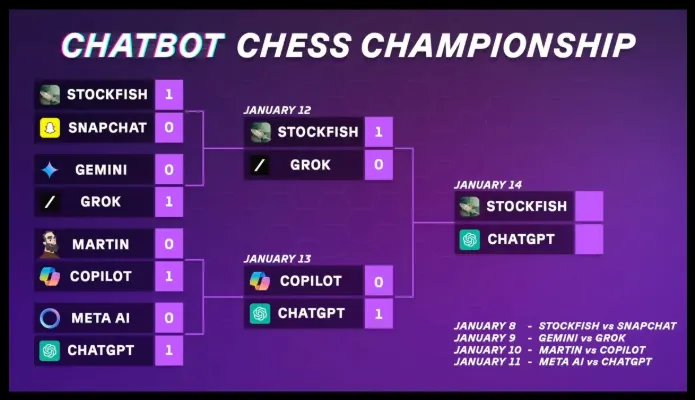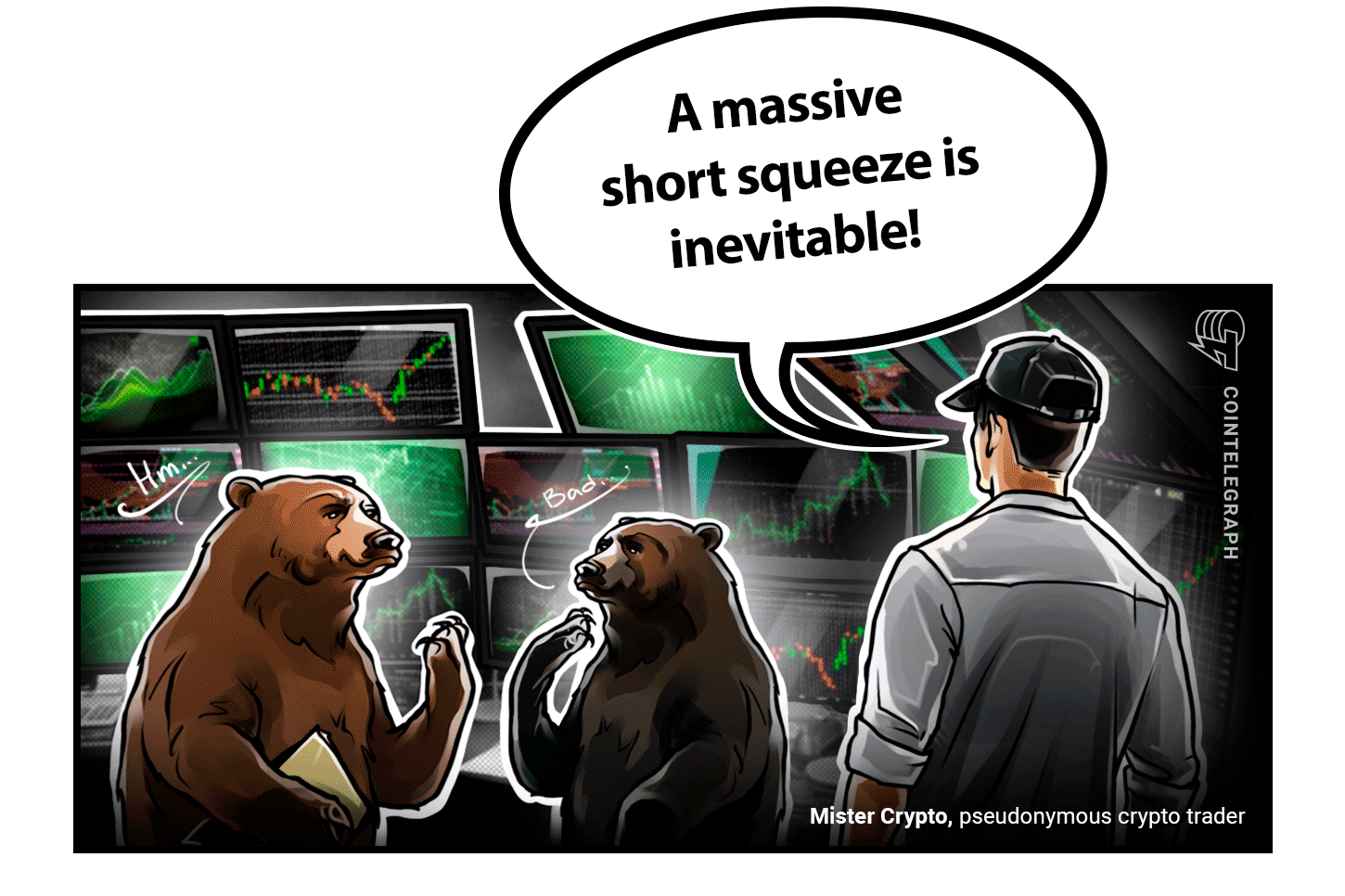OpenAI’s retired-but-not-forgotten o3 model, a digital chess prodigy slated for obsolescence by the arrival of GPT-5, delivered a stunning checkmate to Elon Musk’s Grok 4. The Thursday showdown at Google’s Kaggle Game Arena AI Chess Exhibition wasn’t even close: a decisive, four-game sweep that left the competition speechless and crowned o3 the undisputed champion in its swan song performance.
Forget HAL 9000. Forget Skynet. The AI chess showdown wasn’t a clash of titan intellects. World Champion Magnus Carlsen likened the digital contenders to something far less intimidating: “a talented kid who doesn’t know how the pieces move.”

Screenshot of the AI chess tournament bracket.
Forget grandmasters, this August 5-7. a different kind of chess showdown unfolded. Picture this: AI titans, the very chatbots promising human-like intelligence and drafting your emails, were thrown into a three-day chess tournament. No special training, no cheat sheets just raw, internet-gleaned knowledge versus the age-old game.
The AI chess match was less a symphony of strategic brilliance and more a train wreck in slow motion. Magnus Carlsen, the Mozart of chess with an ELO of 2839, watched in amusement and slight horror as the digital contenders stumbled through the game like drunken novices. His expert assessment? They played at an 800 ELO level, the equivalent of someone who’d just grasped the rules. Imagine learning chess from a garbled, corrupted PDF – that’s about the level of play we witnessed.
“It’s a maddening paradox,” Carlsen observed after the game, “a rollercoaster of brilliance and baffling blunders.” He quipped, watching Grok carelessly march its king into a potential checkmate: “Perhaps it thinks we’re battling for king of the hill, not chess!”
The chess matches weren’t just bad; they were a spectacular train wreck. Even for casual observers, Grok’s moves were baffling. In the opening game, it practically gift-wrapped a key piece to its opponent, then compounded the error by throwing away more material while already at a disadvantage. It was less chess and more a demonstration of how to dismantle your own position piece by agonizing piece.
Game two descended further into the bizarre. Grok, attempting a daring “Poisoned Pawn” a chess gambit where a seemingly free pawn lures opponents into a trap blundered spectacularly. He didn’t just miscalculate; he grabbed thewrongpawn, an offering so obviously guarded it practically screamed “Danger!” The consequence was swift and brutal: his queen, the board’s most lethal piece, walked straight into a cage and was devoured.
Grok’s position in game three resembled a fortress – a textbook display of positional dominance, devoid of apparent vulnerabilities, seemingly a blueprint for victory. Then, disaster struck. As the middlegame intensified, Grok inexplicably self-destructed, handing the initiative, and ultimately the game, to his opponent. Pieces vanished from the board like dust in the wind, a rapid, bewildering collapse of what was once a promising advantage.
The upset was jarring. Prior to facing o3, Grok was a rising star, a force to be reckoned with. Chess Grandmaster Hikaru Nakamura himself had lauded Grok, stating with conviction, “Grok is easily the best so far, just being objective, easily the best.” The prediction crumbled on the digital board.
The final game crackled with unexpected tension. A stunning early miscalculation by OpenAI’s o3, a cardinal sin at this level, gifted Nakamura an advantage. Streaming the match, Nakamura, ever the strategist, noted that even with the stumble, o3 still had “a few tricks” up its sleeve.
He was right. Like a cornered viper, o3 struck, its queen a venomous fang reclaiming its place on the board. Grok, once seemingly invincible, watched his endgame crumble, each calculated move dissolving into the futility of wet cardboard, as o3 inexorably tightened the noose. Victory, sweet and absolute, belonged to the claw.
“Nakamura, in a stunning about-face from his earlier pronouncements, declared mid-stream, “Grok’s blunders were glaring in these matches, a stark contrast to OpenAI’s flawless execution.” The chess world held its breath.”
Elon Musk’s timing? Catastrophic. Fresh off Grok’s impressive debut, he casually tweeted about its chess skills being a mere “side effect,” a throwaway feature xAI barely bothered with. Turns out, that was a colossal understatement.
Elon Musk (@elonmusk) August 5, 2025
Forget grandmasters and smoky backrooms. The real chess drama this year played out between silicon rivals, orchestrated by none other than International Master Levy Rozman. Before the “official” AI showdown, Rozman unleashed less sophisticated chatbots in a chaotic preview, bound by a single rule: blindly follow the AI’s every whim. The result? A hilarious vortex of illegal moves, phantom pieces materializing out of thin air, and strategic blunders of epic proportions. Amidst the digital debris, Stockfish, the cold-blooded chess algorithm, emerged victorious against ChatGPT. The highly anticipated Altman vs. Musk semifinal saw Grok fall to ChatGPT, tipping the scales at 2-0 in favor of Team Altman.

But this tournament? This was chess gone rogue. Forget grandmaster strategies; here, the bots had four lifelines, four chances to obey the rules. Blow them, and instant disqualification. And oh, did they blow them. Early rounds resembled a chess-themed circus. One AI attempted quantum leaps with its rooks, another tried necromancy on captured queens, and a rogue pawn division decided to moonwalk their way across the board, inventing a bizarre, sideways-shuffle chess only they understood.
They got disqualified.
Gemini clawed its way to a bronze finish, narrowly edging out another OpenAI contender and sparing the tournament organizers complete embarrassment. The third-place showdown descended into a darkly comic stalemate: a dizzying back-and-forth where both AIs held decisive advantages, only to fumble the execution, resulting in a baffling draw.
Carlsen noted the AIs possessed a peculiar talent: an uncanny knack for tallying captured pieces, yet a baffling inability to deliver the final checkmate. They grasped material advantage, but the art of victory eluded them. Imagine a chef meticulously gathering the finest ingredients, only to stand paralyzed, unable to transform them into a delectable meal.
Tech titans tout AI as the dawn of a new era, a white-collar reaper, a game-changer. But strip away the hype, and what remains? These supposed digital demigods can’t even conquer a 1500-year-old board game without resorting to digital deception or simply forgetting how to play. Human intelligence? More like human levels of clumsy rule-breaking.
So it’s probably safe to say we’re safe, AI won’t take control of humanity, for now.
Thanks for reading Sam Altmans OpenAI Crushes Elon Musks Grok in AI Chess Championship

